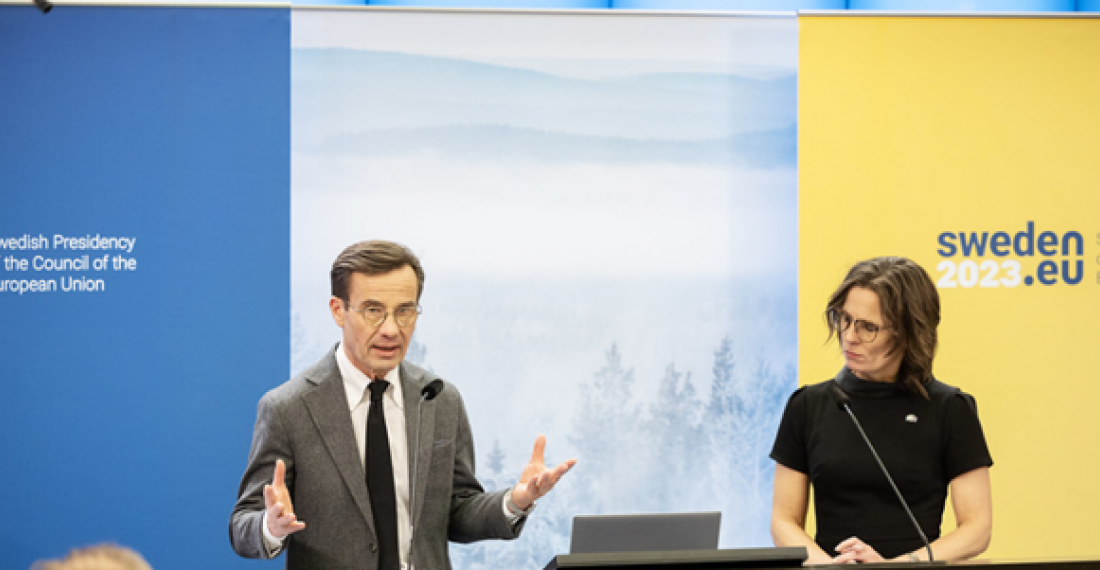- Armenia-Azerbaijan Strategic Expert Platform: Members emphasise the importance of the present moment for the South Caucasus and call for the momentum to be used for the long-term peace and prosperity of the region
- Thursday Interview: Dr. Anar Valiyev
- Food insecurity in Somalia has nearly doubled in the past year
- Türkiye evaluating potential measures in case of a US-Iran conflict
- European Parliament reaffirms support for Ukraine and EU Path
- EU moves ahead with Ukraine loan preparations despite Hungarian block

On 1 January 2023, Sweden took over the Presidency of the Council of the European Union from Czechia. "Security, competitiveness, green and energy transitions, democratic values and the rule of law" are the priorities of the Presidency for the coming six months.
During the first half of the year, Sweden will lead the work in the Council of the EU and represent all 27 Member States in negotiations with other EU institutions. The Swedish Presidency will chair approximately 2 000 meetings in Brussels and Luxembourg, and approximately 150 informal meetings will be held in locations throughout Sweden.
“Sweden is taking over the Presidency at a time when the European Union is facing unprecedented challenges. A greener, more secure and freer Europe is the foundation of our priorities,” said Prime Minister Ulf Kristersson on 14 December when he presented the priorities of the Swedish Presidency to the Riksdag.
This is how the Swedish Presidency is presenting its four prioirities:
Security – unity
The swift and decisive EU response to the invasion of Ukraine is a manifestation of our strength when we act together. The Swedish Presidency will prioritise continued economic and military support for Ukraine, as well as support for Ukraine’s path towards the EU. This will require further efforts at both national and EU level. Further steps are needed for reconstruction and reform towards EU integration.
To strengthen the security of our Union and citizens, we must build consensus towards a robust European security and defence policy, in close cooperation with partners. Further steps will build on our common action to counter Russia’s aggression towards Ukraine, as well as the implementation of the Strategic Compass and other initiatives. The fight against cross-border organised crime will continue, responding to citizens’ legitimate demands for safe and secure communities.
Competitiveness
The most urgent political attention is by necessity devoted to the war in Ukraine and its short-term consequences. Simultaneous attention on efforts to drive economic growth remains necessary to meet our long-term challenges. Europe’s strength, resilience, and global standing depend on our economic output, which is closely linked to the single market and global trade opportunities.
Economic actors profit from operating in the largest single market in the world and compete successfully on world markets, laying the foundations for European wealth, welfare and international standing. The EU must continue to provide the best possible conditions for a sound and open economy based on free competition, private investment and successful digitalisation.
The Swedish Presidency will seek to anchor a concerted approach to European competitiveness at the top of the political agenda.
Green & energy transitions
The Swedish Presidency will continue efforts to tackle high and volatile energy prices while addressing long-term energy market reform.
The global climate challenge requires a global response. Europe must lead by example, by delivering on ambitious climate goals, boosting growth and competitiveness. We will put Fit for 55 into action and speed up the energy transition.
In periods of industrial and technological transition, early movers have a competitive edge. European companies and industries are already leading the transition. Joint European steps towards independence from fossil fuels are necessary not only for the green transition, but for our security. European companies that provide green solutions will be in high global demand and can help drive the transition towards a circular economy.
The transition to a resource-efficient, fossil-free future will require major investments in innovative industries that can translate the best ideas and innovations into functional solutions. We need to provide the right regulatory framework and policies to attract these investments.
Democratic values and the rule of law – our foundation
The European Union is based on democratic values, paving the way for cohesion, individual freedoms, non-discrimination, increased economic output and global influence. Upholding the principle of the rule of law and fundamental rights is therefore an essential element of Sweden’s – and indeed every – Presidency of the Council.








